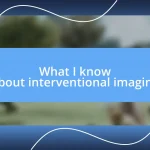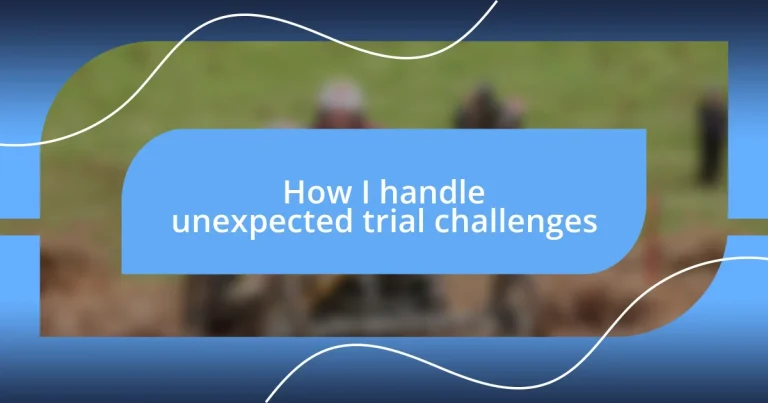Key takeaways:
- Embrace adaptability and flexibility as essential skills to navigate unforeseen trial challenges, allowing for real-time adjustments to strategy and arguments.
- Utilize support systems, including colleagues and professional resources, to enhance problem-solving and foster a collaborative environment in high-pressure situations.
- Implement proactive measures such as creating backup plans and anticipating potential obstacles to build confidence and maintain momentum during trials.
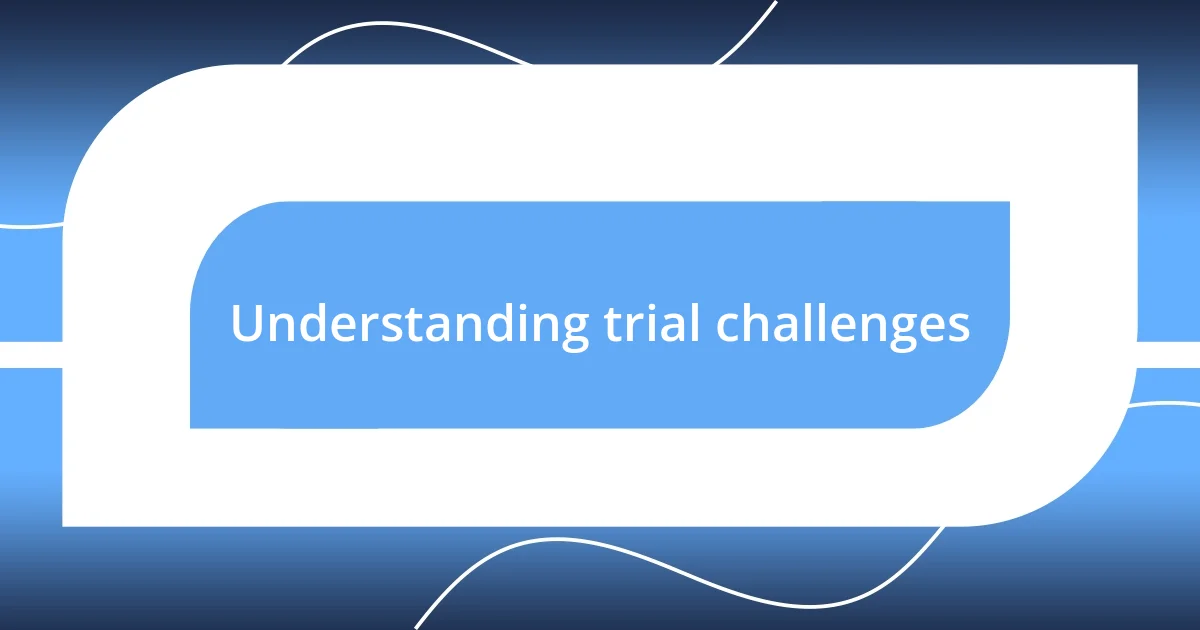
Understanding trial challenges
Trial challenges are often unforeseen, throwing even the most prepared individuals off balance. I remember once facing a surprise witness who had no prior indication of their involvement. The feeling of vulnerability washed over me, but it also sparked an instant need to adapt. How do we ready ourselves for the unpredictable?
These challenges can create a ripple effect, impacting not just the case but the entire emotional atmosphere in the courtroom. I often find myself reflecting on the weight of every decision made under pressure. Have you ever felt that rush when the stakes are high? It’s a blend of anxiety and adrenaline that pushes you to think on your feet.
Each trial challenge is a lesson in resilience. For instance, I once encountered an unexpected evidentiary shift that required me to pivot my entire strategy on the spot. This experience taught me that flexibility is not just a skill; it’s a necessity in navigating the complexities of trial. When we embrace these challenges, we not only learn to handle the unexpected but also grow as advocates.
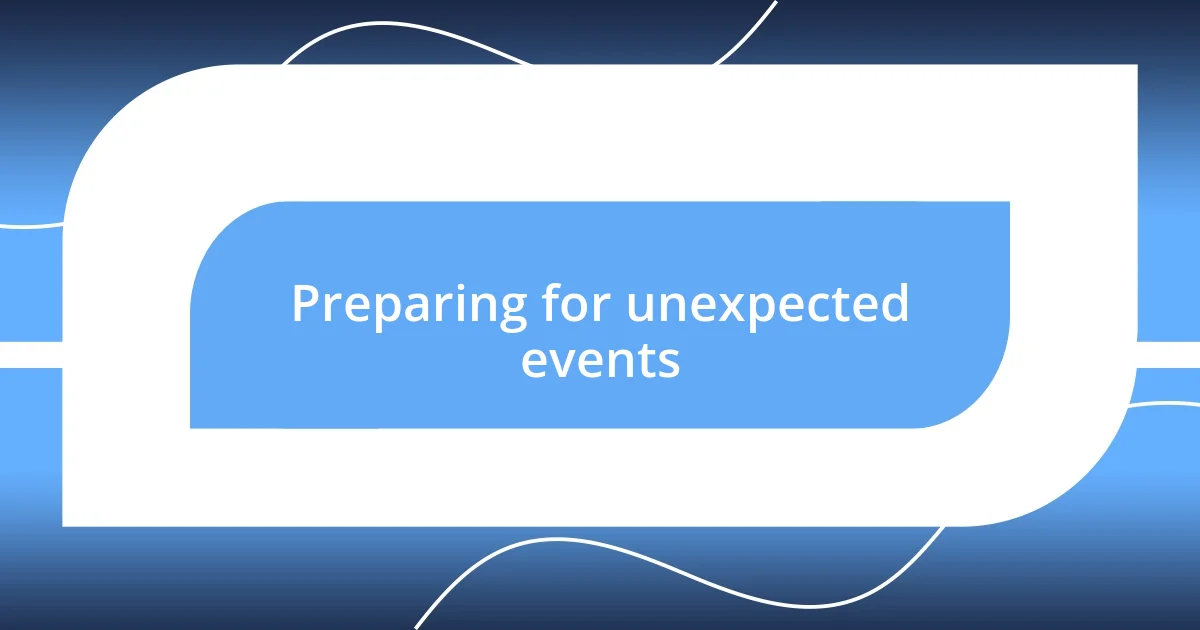
Preparing for unexpected events
Preparing for unexpected events requires a mindset that embraces uncertainty. I recall preparing for a trial where a crucial piece of evidence went missing right before we were set to begin. The sense of panic started to creep in, but I quickly reminded myself that staying calm was key. It’s moments like these that shape how I approach preparation; I’ve learned to anticipate what could go wrong, even if it feels uncomfortable.
To better handle these situations, I’ve found it helpful to implement a few strategies:
-
Create a backup plan: Always have alternatives ready for key pieces of evidence or witnesses.
-
Stay informed: Keep up with the latest developments in your case; being one step ahead can offer peace of mind.
-
Practice adaptability: Simulate unexpected scenarios during preparation to build confidence and experience.
-
Cultivate composure: Develop techniques, such as breathing exercises, to maintain focus when faced with surprise events.
Embracing these strategies not only eases anxiety but also prepares you to tackle challenges when they arise, turning stress into a powerful motivational force.
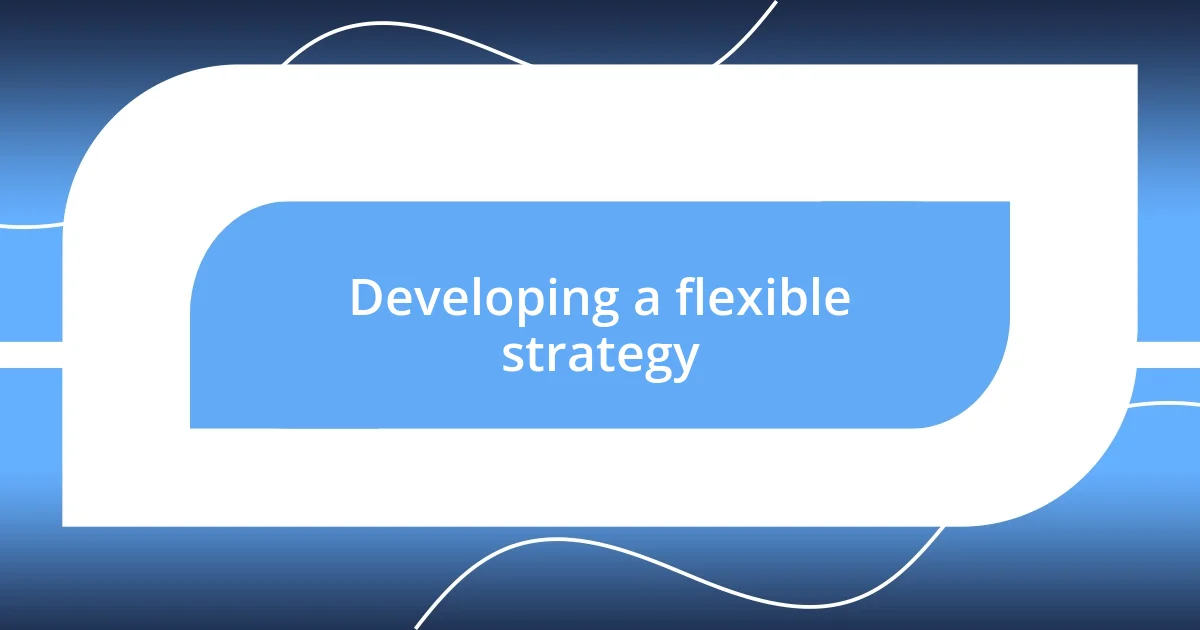
Developing a flexible strategy
Developing a flexible strategy is crucial when navigating unforeseen challenges during a trial. I recall a specific instance when a key witness unexpectedly changed their testimony. My heart raced, and I felt the tension in the room, but rather than panicking, I focused on adjusting my line of questioning in real time. By embracing the change, I found that I could reshape the narrative, turning what felt like a setback into an opportunity to strengthen my case.
Additionally, having a mental toolkit for flexibility is invaluable. I always carry a few strategies up my sleeve, like modifying my argument on the fly or quickly shifting focus to more compelling evidence. For example, once during a trial, I was able to pivot from a weak argument to a more robust line of reasoning after discovering new information mid-session. This adaptability not only surprised opposing counsel but also helped me maintain credibility with the jury. It’s a rhythmic dance of thought and action that often leads to unexpected success.
Lastly, it’s important to foster an open mindset that welcomes uncertainty. I often encourage my colleagues to share their trepidations about unpredictable situations. When one of my peers expressed insecurities about their courtroom presence, we brainstormed tactics together to enhance their confidence. This collaboration deepens our understanding that trials can swing in unexpected ways, and that it’s okay to lean on one another to devise our best strategies.
| Aspect | Static Strategy | Flexible Strategy |
|---|---|---|
| Response to Change | Rigid, often ineffective | Adaptive, encourages quick reprioritization |
| Emotional Resilience | Stress and overwhelm | Calmness and control |
| Preparation | Single plan, limited options | Multiple scenarios, readiness for the unexpected |
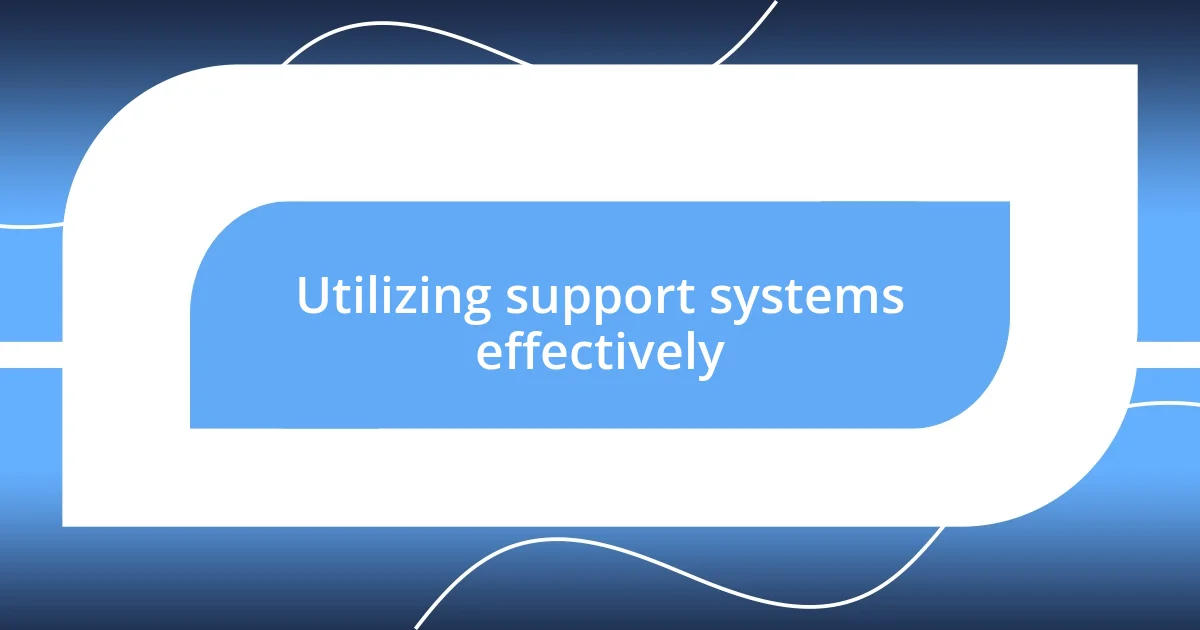
Utilizing support systems effectively
Utilizing support systems effectively is a game-changer when facing trial challenges. I remember a time when an unforeseen technical glitch during a presentation left me in a bind. Instead of spiraling into frustration, I reached out to my technical support team. Their quick response and expertise not only salvaged my presentation but also reinforced my belief in the power of having a reliable network. Have you ever realized how vital it is to collaborate with those who can help? It can truly transform a potential disaster into a manageable hiccup.
In my experience, surrounding myself with supportive colleagues has made all the difference. I often find myself in discussions with fellow attorneys after tough days. Their insights and shared experiences rejuvenate my perspective on challenging cases. For instance, during a particularly demanding trial, I confided in a mentor, discussing my fears and uncertainties. His guidance allowed me to reframe my approach and tackle issues more confidently. Do you think having such a supportive circle can help ease your anxieties during demanding times?
I also believe in the importance of leveraging professional resources such as coaches or consultants. Once, when faced with an unexpected legal twist, I sought out a trial consultant who specialized in crisis management. Their objective viewpoint offered me fresh strategies that I hadn’t considered before. It reminded me that seeking support isn’t a sign of weakness; it’s an empowered choice that can exponentially enhance our performance. Have you ever taken that leap to consult outside experts? It can open doors you never knew existed.
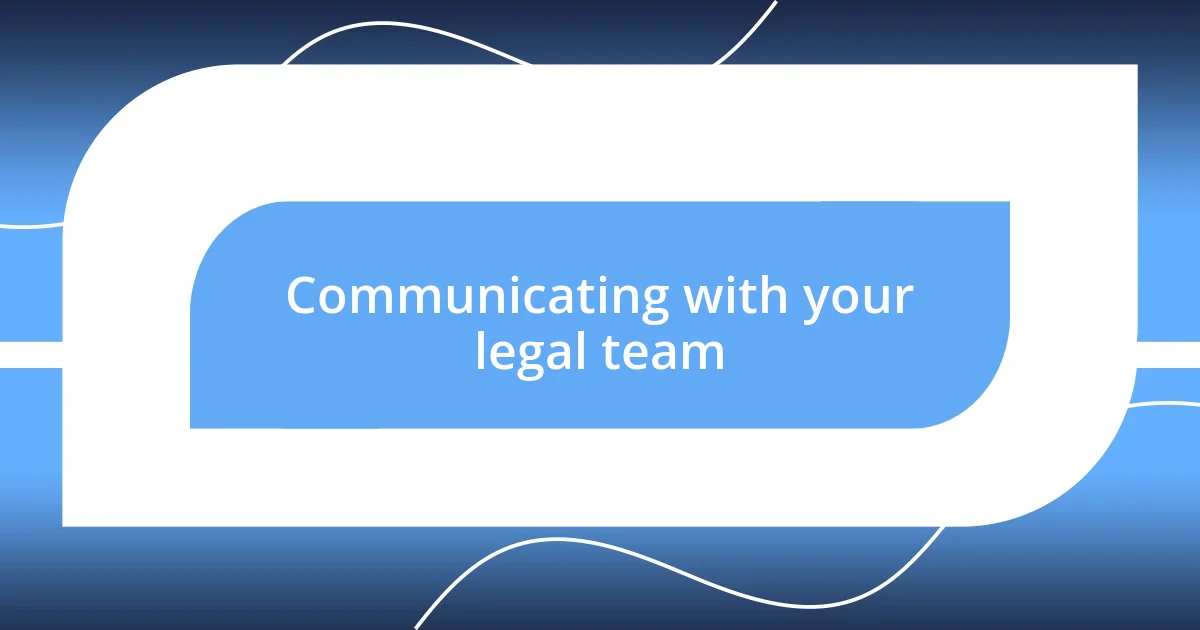
Communicating with your legal team
When it comes to communicating with your legal team, clarity is key. In my experience, I’ve found that being open and direct about my concerns or unexpected challenges fosters a supportive environment. I remember a high-stakes moment when I hesitated to share my doubts about our strategy. I finally opened up during a team meeting, and it turned out that others felt the same way. This honesty turned into a productive brainstorming session, ultimately strengthening our case preparation.
In addition to clarity, I’ve learned that timing matters in communication. Reaching out to my legal team immediately when I encounter surprises helps us adapt swiftly. I had a situation where a last-minute court ruling changed the ground beneath our feet. By calling an urgent team huddle to discuss our new approach, we could regroup and re-strategize effectively. This proactive communication allowed us to maintain our momentum, which, in hindsight, was pivotal.
Finally, I believe in the power of regular check-ins. Scheduling consistent updates keeps everyone on the same page and allows us to address potential issues before they escalate. Once, I initiated weekly touchpoint meetings during a particularly complex case. These calls not only kept the lines of communication open but also built camaraderie and trust within the team. Have you considered how a simple weekly chat could transform your team dynamic and response to challenges? It truly makes a difference.
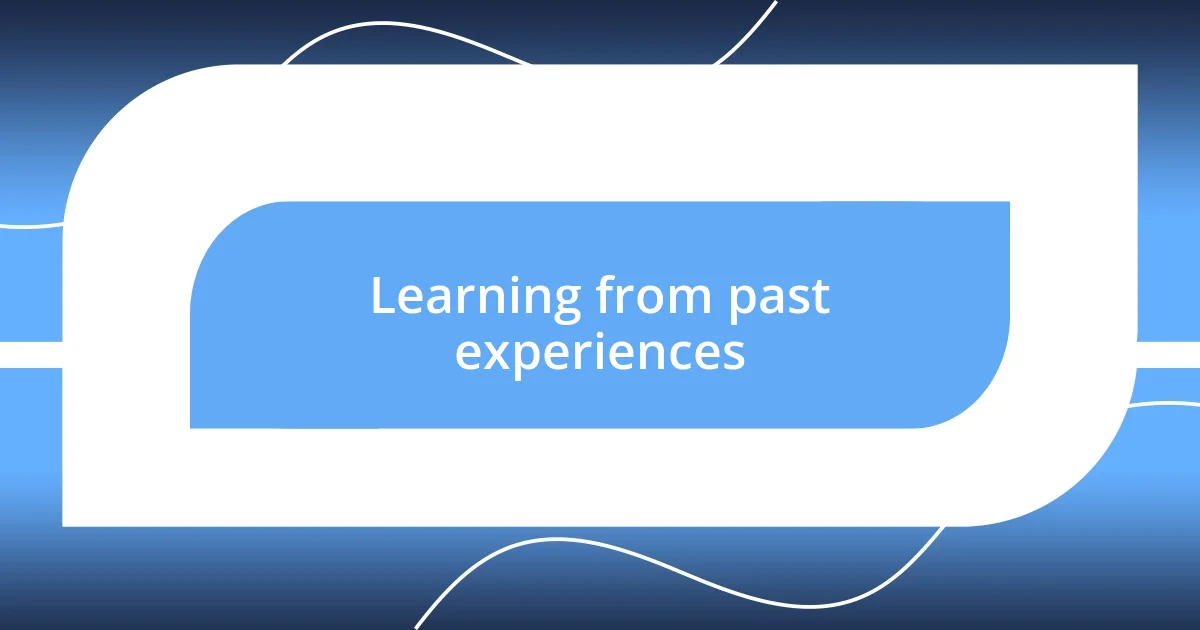
Learning from past experiences
Reflecting on past experiences has been instrumental in my personal growth as a professional. I remember facing an unexpected trial challenge that shook my confidence. After that, I took a moment to analyze what went wrong and how I reacted. This self-reflection allowed me to identify not only my weaknesses but also the valuable lessons that emerged from the chaos. Have you ever noticed how revisiting those moments can lead to better strategies for the future?
One specific instance comes to mind when I was unprepared for a sudden change in a key piece of evidence. Instead of letting it derail me, I revisited similar situations from the past where I managed to adapt and overcome. I came up with a plan, drawing from those earlier experiences to navigate the new reality before me. It’s funny how our past can serve as a compass, guiding us through uncharted territory. Have you found that reflecting on your previous challenges helps you face current ones with greater confidence?
I genuinely believe that learning from each challenge is like collecting tools for our professional toolbox. Each unexpected twist teaches us something unique. I can’t help but smile when I think of the trials I dreaded but ultimately learned to embrace. Remember that time when I had to pivot at the last moment during a crucial trial? I took that experience and now approach challenges with a sense of curiosity rather than fear. Have you thought about how these lessons can reshape your outlook? Embracing past struggles not only equips us but also empowers us to tackle future challenges head-on.
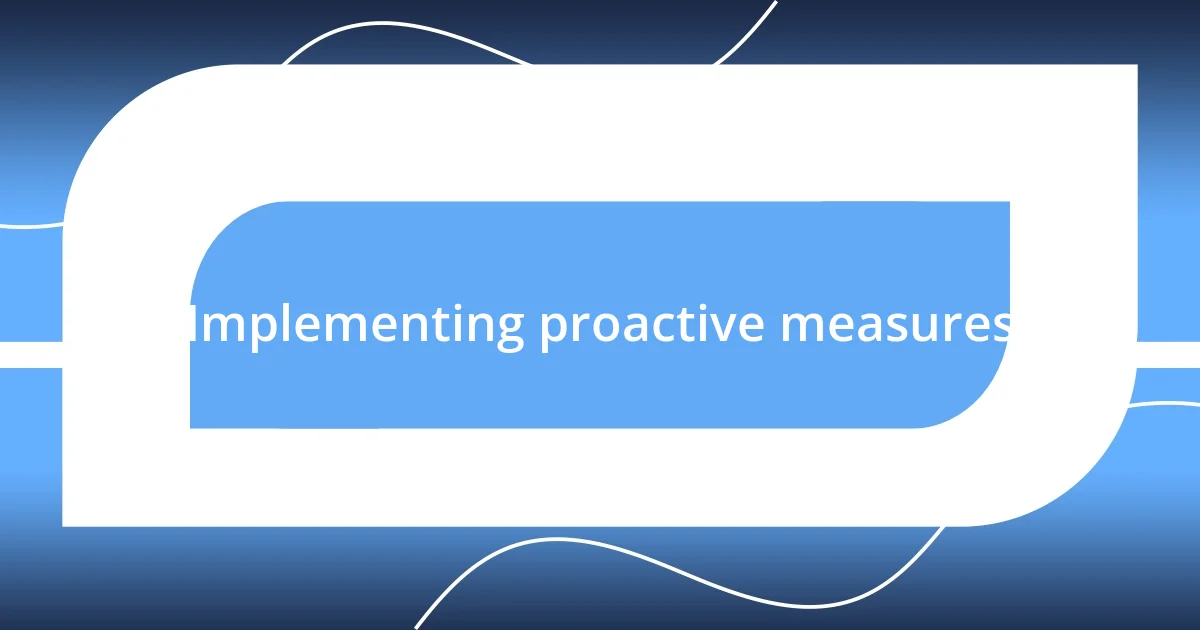
Implementing proactive measures
Implementing proactive measures has become essential in my approach to unexpected trial challenges. For instance, I once faced a situation where I realized that a lack of adequate research on a new legal precedent could hurt our case. So, I took the initiative to set up a mini-workshop with my team, where we could collectively dive into this new area of law. Not only did this preparation boost our confidence, but it also equipped us with a wider perspective to counter any surprise arguments during the trial. Have you ever thought about how a little extra preparation can create a safety net when things spiral out of control?
Another crucial strategy lies in anticipating potential obstacles before they arise. I remember when I was preparing for a case, I created a list of all possible challenges we could face, from witness availability to unexpected evidence disclosures. I shared this list with my legal team, and together, we brainstormed actionable solutions for each item. That foresight paid off during the trial when an unexpected witness decided to back out. Being prepared meant we could quickly adapt and fill the gap without losing momentum. Doesn’t it feel empowering to know you’ve preemptively tackled what could have been a major stumbling block?
Lastly, I’ve found that embracing a culture of adaptability is one of the best proactive measures. There was a time when we faced a scheduling conflict with court hearings—and it caught us off guard. Instead of panicking, I encouraged my team to explore alternative strategies, including leveraging technology to adjust our timelines. We collaborated closely, and our ability to pivot on such short notice not only brought us together but also turned what could have been a disaster into a seamless transition. How do you think fostering an adaptable mindset could help you navigate through unexpected curveballs in your own professional journey?







